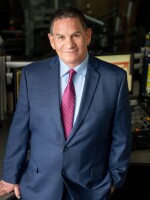He was one of Ventura County’s first responders for nearly three decades and served as the county’s Sheriff for more than a decade. But, five weeks ago Bob Brooks was on the other side of a 911 call. He was having a heart attack.
"I was at home, and I had a stabbing pain in my back, which I've never associated with a heart attack," said Brooks. "It went away after a few hours. I had a normal day. The next day, I had a normal day, had lunch with some friends, was watching TV with my wife, and it started to hurt a little bit in the back, and then it just gripped me from the waist up. Everything was being crushed. I knew I was in big trouble."
Brooks knew he needed paramedics and an ambulance.
"My wife said we'll go to the ER. I couldn't wait in the lobby for somebody to see me. I needed help right away. So I told her to call 911," said Brooks. "They were there in seven minutes, both fire crews and ambulance. They knew I had a heart attack, and the back pain was the initial attack, and the secondary one was what got me to call 911."
The 74-year-old man was taken to the emergency room at Adventist Health Simi Valley.
"When he came in, he was pretty clear he was having some chest pain that was very possible of cardiac origin. We called in the cardiologist, and came up with a plan." said Dr. Ira Tilles, who is the Emergency Department’s Assistant Medical Director.
Brooks was taken to the hospital’s state of the art catheterization lab.
"No doubt I had to get help really quickly," said Brooks. "I couldn't breathe. They got me to the cath lab, and I had surgery almost immediately, two stents. The technology is amazing. I was medicated, obviously, and it didn't show, and it didn't hurt. I was thinking I am waiting to be operated on, and I already had been." They inserted the stents by going up a vein in his wrist.
Today, Brooks is back at the hospital to thank the staff that saved his life. As he visits the cath lab, one of the nurses not only shows us the facility, she shows us images of the sheriff’s heart before, and after he had his procedure.
"This is your heart. Here is your heart before," said Jody Weston, as she points to the images on the screen. "You can see that really narrow area where we don't even want to see you sneeze. And the arteries feed the muscle of your heart. So if those are narrow, or obstructed, your heart muscle is starving for blood flow, and oxygen. Once we determined what vessel is affected, we go in with a balloon, and angioplasty the site, and if appropriate, we'll stent it. After the stents went in, they opened the blood flow to your heart."
Brooks spent four days at the hospital. "The day that I went home, I felt relatively normal, not short of breath." He's back exercising, and said he feels good.
Dr. Tilles said it’s amazing to see how well Brooks is doing just weeks after his heart attack. "This is why we went into medicine," said Tilles. "The reason we are all in the emergency department is that we get the biggest bang for the buck. We get to make them healthy, and that's a good feeling."
Also visiting the hospital is Ventura County Fire Captain Mark Villasenor.
He was one of the first responders who showed up at the retired sheriff’s house, helped to stabilize him, and then got him to the hospital. "This is one of the rewards, to follow up on a call like this, and to see the outcome be a positive outcome," said the firefighter.
Brooks, who was a longtime first responder, has praise for the ones who initially treated him, as well as the Adventist Health Hospital’s staff.
"I couldn't say enough about them. I owe them a lot," said the retired sheriff.
He also has a message. He admits he should have gone to the ER the first time he had some serious pain, instead of waiting until it happened again the next day. Brooks said he’s lucky he came through it okay, but he said if you have heart attack symptoms, don’t wait—call 911, because you might not be as fortunate.
"I didn't listen quickly enough," said Brooks. "The back pain was the first sign I should have gone to the ER. That would have given them a full 24 hours to treat me before it caused damage to the heart."



